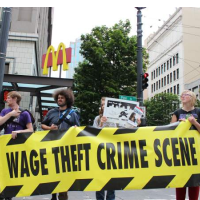Feds Find “Alarming” Minimum-Wage Violations in California and New York

The minimum wages in California and New York are at historic lows when inflation is considered, but that hasn’t stopped employers from breaking the law and underpaying hundreds of thousands of workers in the two states.
A study (pdf) produced for the U.S. Department of Labor found that 3.5% of California workers and 6.5% of New Yorkers were paid less than the minimum wage in 2011. That translates to 10.9% of low-wage earners in L.A. and 19.5% in N.Y.
Researchers used data from two distinct U.S. Census Bureau sources in reaching conclusions that extended the limited sampling of offenses. The sources provided often striking differences in their assessments of the problem, but both agreed the problem was far-reaching.
Using the Current Population Survey, the study, conducted by Eastern Research Group, concluded that 7,000 people in California were forced below the poverty line by minimum wage violations. The Survey of Income and Program Participation (SIPP) put that number at 41,000.
The study blamed pay violations for an increase of $15.6 million in spending for school breakfast and lunch programs in California and $11 million for food stamps.
The Labor Department extrapolated the data to calculate that 2 million workers nationwide were victims of the wage theft, even using a violation rate half of what it found in the two largest states. The restaurant and hotel industries led the way, but plenty of others joined in. Younger workers fared much worse than older workers and women a little worse than men.
“These findings are alarming in terms of the prevalence of the problem, particularly in a set of industries where we already know workers earn low wages and struggle to earn a basic family budget,” David Weil, administrator of the Labor Department’s Wage and Hour Division, told the New York Times.
The Times used a photograph of glowering McDonald’s cashier Guadalupe Salazar to illustrate the story and a snarling photo of her in August when it reported on a “flood” of wage theft lawsuits being filed across the country. California State Labor Commissioner Julie Su told the newspaper, “My agency has found more wages being stolen from workers in California than any time in history.”
The business community, which by and large opposes minimum wage increases if they support the wage at all, argues that wage theft is poorly measured and overstated for social and political reasons. Recent local and state minimum wage increases have triggered a wave of optimism among supporters that opposition to it “is crumbling.”
Even Container Store CEO Kip Tindell, who is chairman of the National Retail Federation (NRF), thinks, “It’s unbecoming to speak out against raising the minimum wage.”
That’s a fashion that could change if a Republican is elected president in 2016 and every other lever of government remains in GOP hands. Labor Secretary Thomas Perez told a conference on wage enforcement last week, “The law is only as effective as the political will of those enforcing.”
He meant it as a call to arms, but it resonates as an admission of what got the nation to this place and will probably keep it there for awhile.
–Ken Broder
To Learn More:
Study Finds Violations of Wage Law in New York and California (by Steven Greenhouse, New York Times)
Wage Watch: Study Finds "Alarming" Wage Violations by Employers in Two States (by Claire Zillman, Fortune)
Why Conservatives Oppose Raising the Minimum Wage (by Dustin Hawkins, About News)
Employers Rip off L.A.'s Army of Low-Income Immigrant Garment Workers (by Ken Broder, AllGov California)
Lawsuits Accuse Major Employers of Squeezing Extra Dollars out of Low-Wage Workers (by Noel Brinkerhoff and Steve Straehley, AllGov)
The Social and Economic Effects of Wage Violations: Estimates for California and New York (U.S. Department of Labor) (pdf)
- Top Stories
- Controversies
- Where is the Money Going?
- California and the Nation
- Appointments and Resignations
- Unusual News
- Latest News
- California Forbids U.S. Immigration Agents from Pretending to be Police
- California Lawmakers Urged to Strip “Self-Dealing” Tax Board of Its Duties
- Big Oil’s Grip on California
- Santa Cruz Police See Homeland Security Betrayal in Use of Gang Roundup as Cover for Immigration Raid
- Oil Companies Face Deadline to Stop Polluting California Groundwater





